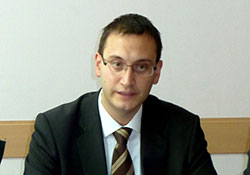Evidence-based evaluation of primary health care in Republic of Moldova

WHO
Findings of a primary health care (PHC) survey in the Republic of Moldova were presented and discussed at a policy dialogue meeting in May 2012 in Chisinau hosted by the National Centre of Health Management. Participants discussed bottlenecks in PHC and considered possible improvements of the health system. Important topics included:
- lack of transparency of out-of pocket payments;
- the need for continuous learning for family doctors;
- usage of medical records on a larger scale.
A final report evaluating the structure and provision of primary health care in the Republic of Moldova, and laying out the main directions for further work in this area, will be launched in September 2012.
The PHC survey and policy dialogue were conducted as part of a WHO Primary Care Evaluation Tool (PCET) implementation project launched in the Republic of Moldova in 2010.
Background
In many countries in transition, health reforms are part of profound and comprehensive changes in essential societal functions and values. Reforms of (primary) care are not always based on evidence, but policy-makers and managers nowadays increasingly demand evidence of the progress of reforms and the responsiveness of services. The WHO Primary Care Evaluation Tool (PCET) aims at providing information on the current state of primary care based on a methodology that characterizes a good primary care (PHC) service delivery system as comprehensive, accessible, coordinated and integrated, and as one that ensures continuity. The methodology takes equally into consideration:
- financing
- service delivery
- human resources
- other resources, such as appropriate facilities, equipment and drugs,
- that all necessary legal frameworks and regulations are in place and the system is steered by the right “leader”.
It thus offers a structured overview of the strengths and weaknesses of a country’s organization of primary care services, including the voice of the professionals and patients concerned, to interested policy-makers and stakeholders.



